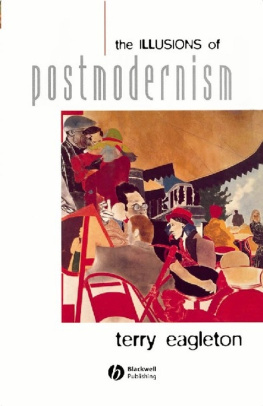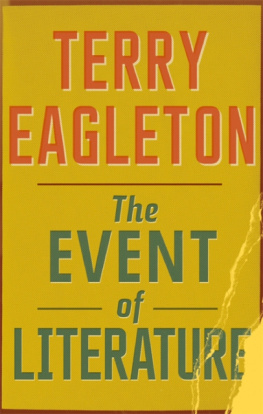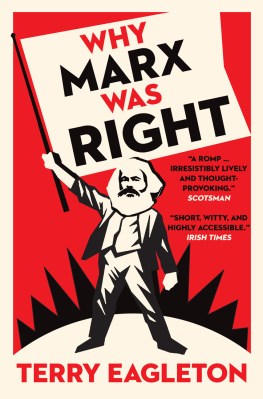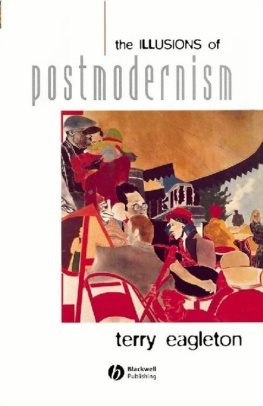Eagleton - The Illusions of Postmodernism
Here you can read online Eagleton - The Illusions of Postmodernism full text of the book (entire story) in english for free. Download pdf and epub, get meaning, cover and reviews about this ebook. City: Cambridge (USA);Oxford (UK, year: 1996;2013, publisher: Wiley;Blackwell, genre: Politics. Description of the work, (preface) as well as reviews are available. Best literature library LitArk.com created for fans of good reading and offers a wide selection of genres:
Romance novel
Science fiction
Adventure
Detective
Science
History
Home and family
Prose
Art
Politics
Computer
Non-fiction
Religion
Business
Children
Humor
Choose a favorite category and find really read worthwhile books. Enjoy immersion in the world of imagination, feel the emotions of the characters or learn something new for yourself, make an fascinating discovery.
The Illusions of Postmodernism: summary, description and annotation
We offer to read an annotation, description, summary or preface (depends on what the author of the book "The Illusions of Postmodernism" wrote himself). If you haven't found the necessary information about the book — write in the comments, we will try to find it.
The Illusions of Postmodernism — read online for free the complete book (whole text) full work
Below is the text of the book, divided by pages. System saving the place of the last page read, allows you to conveniently read the book "The Illusions of Postmodernism" online for free, without having to search again every time where you left off. Put a bookmark, and you can go to the page where you finished reading at any time.
Font size:
Interval:
Bookmark:

For Willa

1996 by Terry Eagleton
BLACKWELL PUBLISHING
350 Main Street, Malden, MA 02148-5020, USA
108 Cowley Road, Oxford OX4 1JF, UK
550 Swanston Street, Carlton, Victoria 3053, Australia
The right of Terry Eagleton to be identified as the Author of this Work has been asserted in accordance with the UK Copyright, Designs, and Patents Act 1988.
All rights reserved. No part of this publication may be reproduced, stored in a retrieval system, or transmitted, in any form or by any means, electronic, mechanical, photocopying, recording or otherwise, except as permitted by the UK Copyright, Designs, and Patents Act 1988, without the prior permission of the publisher.
First published 1996
10 2009
Library of Congress Cataloging-in-Publication Data
Eagleton, Terry, 1943
The illusions of postmodernism / Terry Eagleton
p. cm.
Includes bibliographical references (p. ) and index.
ISBN 0631203222 (alk. paper)
ISBN 0631203230 (pbk : alk. paper)
1. Postmodernism. I. Title.
B831.2.E18 1996 968101
149dc20 CIP
ISBN 9780631203230 (pbk : alk . paper)
A catalogue record for this title is available from the British Library.
For further information on Blackwell Publishing, visit our website: www.blackwellpublishing.com
Preface
The word postmodernism generally refers to a form of contemporary culture, whereas the term postmodernity alludes to a specific historical period. Postmodernity is a style of thought which is suspicious of classical notions of truth, reason, identity and objectivity, of the idea of universal progress or emancipation, of single frameworks, grand narratives or ultimate grounds of explanation. Against these Enlightenment norms, it sees the world as contingent, ungrounded, diverse, unstable, indeterminate, a set of disunified cultures or interpretations which breed a degree of scepticism about the objectivity of truth, history and norms, the givenness of natures and the coherence of identities. This way of seeing, so some would claim, has real material conditions: it springs from an historic shift in the West to a new form of capitalism to the ephemeral, decentralized world of technology, consumerism and the culture industry, in which the service, finance and information industries triumph over traditional manufacture, and classical class politics yield ground to a diffuse range of identity polities. Postmodernism is a style of culture which reflects something of this epochal change, in a depthless, decentred, ungrounded, self-reflexive, playful, derivative, eclectic, pluralistic art which blurs the boundaries between high and popular culture, as well as between art and everyday experience. How dominant or pervasive this culture is whether it goes all the way down, or figures just as one particular region within contemporary life is a matter of argument.
This distinction between postmodernism and postmodernity seems to me useful, but it is not one which I have particularly respected in this book. I have tended to stick to the more familiar term postmodernism to cover both of these things, since they are clearly closely related. But my interest here is more in the ideas than in the artistic culture, which is why there is no discussion of particular works of art. There is not much discussion of particular theorists either, which may strike some as strange. But my concern is less with the more recherch formulations of postmodern philosophy than with the culture or milieu or even sensibility of postmodernism as a whole. I have in mind less the higher philosophical flights of the subject than what a particular kind of student today is likely to believe; and though I consider quite a lot of what they believe to be false, I have tried to say so in a way which might persuade them that they never believed it in the first place. In the process, I accuse postmodernism from time to time of straw-targeting or caricaturing its opponents positions, a charge which might well be turned back upon my own account. But this is partly because I have in my sights precisely such popular brands of postmodern thought, and partly because postmodernism is such a portmanteau phenomenon that anything you assert of one piece of it is almost bound to be untrue of another. Thus some of the views I attribute to postmodernism in general might well be qualified or even rejected in the work of a particular theorist; but they constitute even so a kind of received wisdom, and to this extent I do not consider myself guilty of excessive travesty. On the contrary, though my review of the topic is generally a negative one, I have tried to give postmodernism its due where I can, drawing attention to its strengths along with its failings. It is not just a question of being pro- or anti-postmodern, though in my view it is more a question of being against rather than for. Just as postmodernist itself means not just that you have left modernism definitively behind, but that you have worked your way through it to a position still deeply marked by it, so there may be a kind of pre-postmodernism which has worked its way through postmodernism and come out roughly on the side where it started, which is by no means the same as not having shifted at all.
Part of postmodernisms power is the fact it exists, whereas how true this is of socialism these days is rather more debatable. Pace Hegel, it would seem at present that what is real is irrational, and what is rational is unreal. Throughout this study, I have judged postmodernism from a broadly socialist perspective; but this should not of course be taken to imply that socialism does not have its problems too. On the contrary, it is now probably more plagued and notional an idea than at any stage in its turbulent career. It would be intellectual dishonesty to pretend that Marxism is any longer a living political reality, or that the prospects for socialist change, for the moment at least, are anything but exceedingly remote. It is just that it would be a good deal worse than dishonest in such circumstances to relinquish the vision of a just society, and so to acquiesce in the appalling mess which is the contemporary world. I am not, then, proposing that we have some fully-fledged alternative to postmodernism at our fingertips, just that we can do rather better; and one doesnt need to be a convinced socialist, let alone a devout Marxist, to concur with that.
A word, finally, on giving comfort to ones opponents. I have tried to criticize postmodernism from a political and theoretical perspective, rather than in the style of some banal common-sense reaction. But it is probably unavoidable that some of what I argue will be endorsed by conservatives who assail postmodernism for what I would myself consider all the most disreputable reasons. Radicals and conservatives, after all, necessarily share some ground in common, and if they did not would be incommensurable rather than at odds with one another. Radicals, for example, are traditionalists, just as conservatives are; it is simply that they adhere to entirely different traditions. Those postmodernists who hold that radicals should not criticize each other lest it delight the heart of reactionaries should recall the limits of a politics based on opportunism rather than truth, however much they would prefer the latter term to go in scare quotes. If conservative readers do indeed find themselves heartily endorsing the socialist transformation of society after reading the book, then I shall be delighted.
Next pageFont size:
Interval:
Bookmark:
Similar books «The Illusions of Postmodernism»
Look at similar books to The Illusions of Postmodernism. We have selected literature similar in name and meaning in the hope of providing readers with more options to find new, interesting, not yet read works.
Discussion, reviews of the book The Illusions of Postmodernism and just readers' own opinions. Leave your comments, write what you think about the work, its meaning or the main characters. Specify what exactly you liked and what you didn't like, and why you think so.















